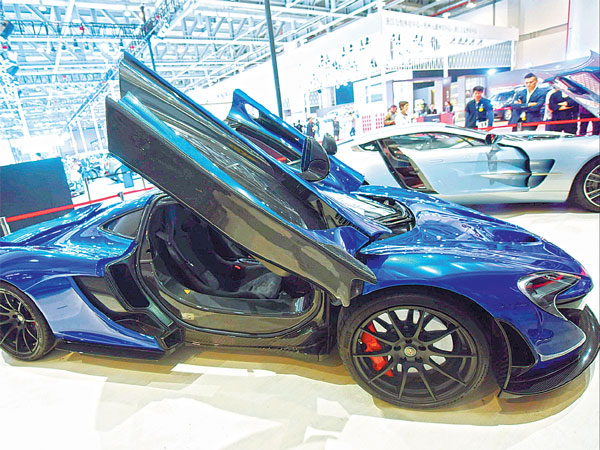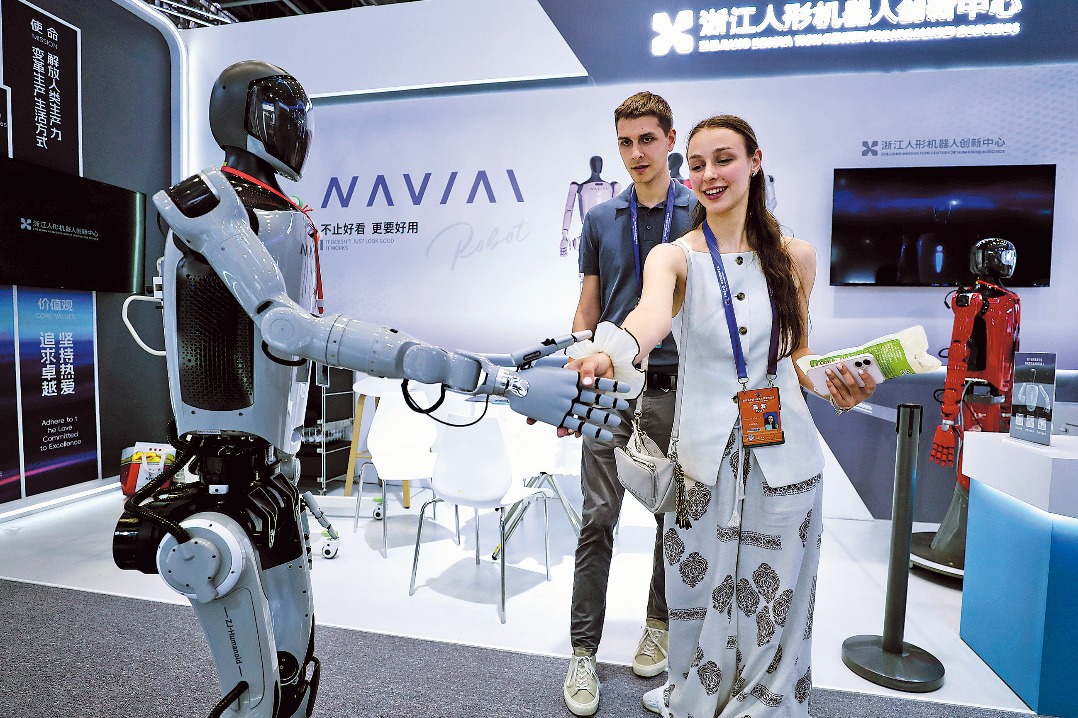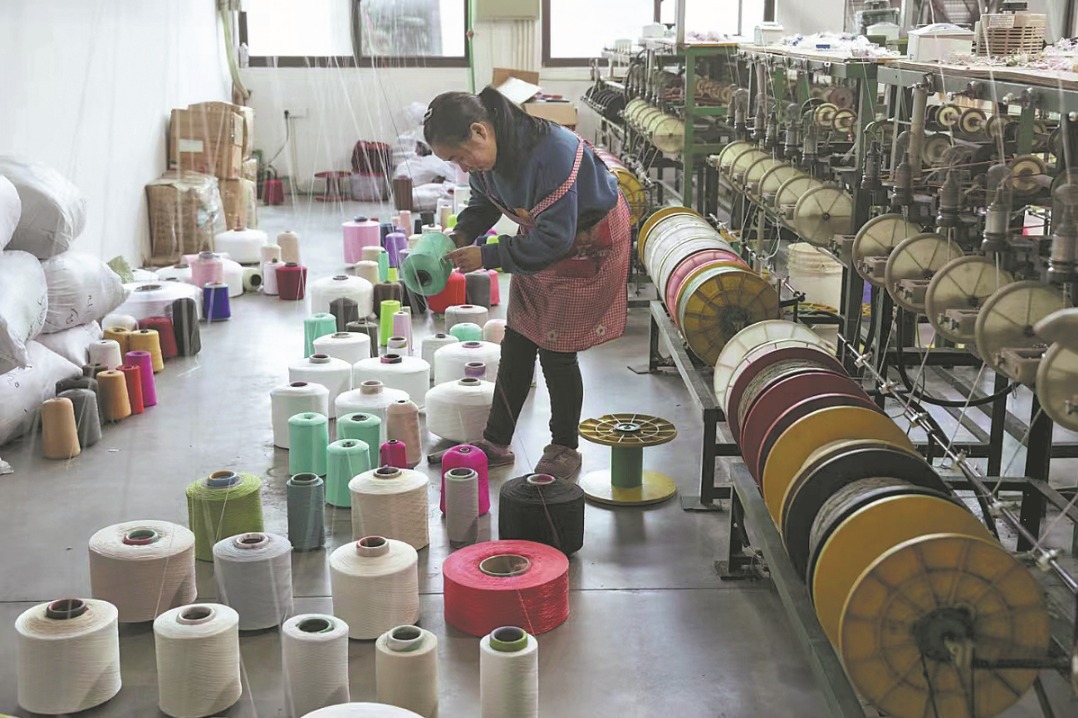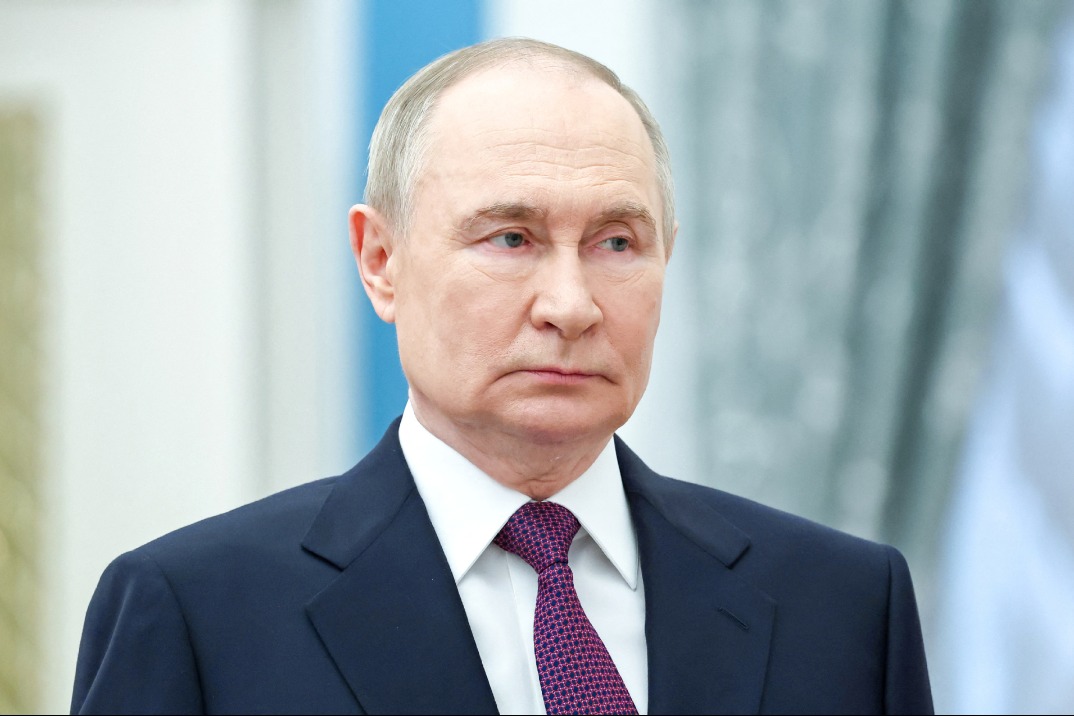IN BRIEF (Page 24)

| LaFerrari, a hybrid sports car designed by Ferrari of Italy with a price tag of $3.4 million (2.9 million euros; £2.6 million), debuts at a car exhibition in Hangzhou, Zhejiang province. Long Wei / China Daily |
More FDI moves in the pipeline
China is contemplating more measures to improve the overall business environment for foreign companies focused on the services sector, including a lower cross-border investment threshold, a leading think tank said on Oct 17. The key objective of the blueprint under consideration is attracting more foreign investment despite China's ongoing economic rebalancing. "The aim is to build China as the world's best investment destination in the eyes of foreign companies during the next five years," said Wei Jianguo, vice-president of the China Center for International Economic Exchanges. Reforms in the pipeline include a further reduction in the foreign direct investment threshold, the creation of more free trade zones and the rolling out of a nationwide negative list, said Wei, the former vice-minister of commerce.
ODI from nonfinancial sectors drops by 41.9%
China's outbound direct investment from nonfinancial sectors dropped by 41.9 percent year-on-year to $78.03 billion (66 billion euros; £59 billion) between January and September, the Ministry of Commerce announced on Oct 17. The drop in the country's ODI during this period narrowed by 3.9 percentage points from the first half of the year, indicating that China kept deploying more investment in manufacturing and modern service-related businesses in global markets. Investment in leasing and commercial services accounted for 32 percent of the country's total ODI during the nine-month period, while manufacturing accounted for 17.3 percent, retail for 12.2 percent and information-related businesses 10.5 percent, the ministry said. Companies from China invested in 5,159 companies in 154 countries and regions from January to September and signed $168.2 billion in new contracts for overseas projects, a rise of 13.8 percent year-on-year. The ministry said China would continue to tighten its review of the authenticity of overseas investment and its compliance with regulations, and guide more investment into the real economy and reduce investment in sectors in which Chinese companies are not proficient at managing. Meanwhile, outbound investment in 57 economies related to the Belt and Road Initiative stood at $9.6 billion, accounting for 12.3 percent of total ODI, up by 4 percentage points year-on-year.
Intelligent logistics given a big boost
Major Chinese online retailers are beefing up efforts to build intelligent logistics systems, by deploying robots in warehouses to enhance work efficiency, in preparation for the upcoming Singles Day shopping spree. Cainiao Network Technology Co Ltd, the smart logistics network of e-commerce giant Alibaba Group Holding Ltd, announced on Oct 17 it had launched a flagship intelligent warehouse in Huiyang, Guangdong province, containing a fleet of more than 100 mobile robots. The robots are responsible for moving goods in the warehouse. They are activated once a shopper places an order on Alibaba's B2C shopping site Tmall, and the robot sends information about the shelf containing the parcel to a warehouse clerk, who will sort through the parcels and later ship the designated order to the customer. Cainiao said it would launch such warehouses in Shanghai, Tianjin, Zhejiang, Guangdong and Hubei before Nov 11.
Haier focusing on interconnected factories
Chinese home appliance giant Haier Group will have 10 interconnected factories in the United States, Europe and Asia-Pacific markets by the middle of next year, said a top executive. The move is part of the group's long-term commitment to transform from a traditional manufacturer into a nimble and intelligent producer in the internet age. Haier's interconnected factories focus on developing a flexible mass customization process by using intelligent technologies, "with core competency of user-orientation and fulfillment of user lifetime value", says Chen Lucheng, vice-president of Haier. "The strategy targeting foreign markets aims to further meet the demand of local users, since sales in the United States, Europe and Asia-Pacific account for a larger proportion of the group sales."
Huawei challenges Apple with Mate 10
Huawei Technologies Co Ltd is banking on its artificial-intelligence-enabled smartphone Mate 10 to counter US tech giant Apple's dominance in the top-end smartphone segment, analysts said on Oct 17. Jia Mo, an analyst at global consultancy Canalys, said the Kirin 970 AI chipset is the biggest advantage of Mate 10, which was unveiled by Huawei in Germany on Oct 16. "It enables better photo-taking and real-time translation capabilities that can help Huawei wrest some market share from Apple in China and cement its position in the premium segment," Jia said. Mate 10, which starts from 699 euros ($822; £624) in the European market, is the most advanced smartphone launched by Huawei targeting business professionals. The AI chipset enables the new device's cameras to identify 13 types of object, such as people and plants, when being photographed, and to adjust settings such as correction filters in accordance with the surrounding environment.
Banking sector's risks down in third quarter
Risks in China's banking sector continued to decline in the third quarter of the year, with falling interbank business and slower growth in wealth management products. By the end of September, interbank assets and liabilities, major indicators for shadow-banking activities, were down by 2.6 trillion yuan ($400 billion; 340.7 billion euros; £303.9 billion) and 2 trillion yuan from the beginning of the year, respectively, the China Banking Regulatory Commission said in a statement. The growth in the value of WMPs have seen eight consecutive months of slowdown to retreat to 4 percent, down by 30 percentage points from a year ago. Outstanding WMPs shrank by 2.6 trillion yuan from the beginning of the year. The figures came after a regulatory campaign against irregularities in the financial market this year. "The trend of capital flowing out of the real economy was curbed, and the risk posed by the shadow-banking sector was reduced," the CBRC said.
Musical instrument sales hit high note
Musical instrument sales in China are estimated to exceed 40.6 billion yuan ($6.1 billion; 5.2 billion euros; £4.6 billion) in 2017, an industry association says. Musical instrument sales have soared in recent years as more Chinese children, particularly those in big cities, take up music as an extracurricular activity. In the first half of the year, 253 musical instrument makers, whose sales revenue exceeded 20 million yuan each, recorded total sales of 19 billion yuan, says the China Musical Instrument Association. In 2012, full-year sales were 24.5 billion yuan. In the January-June period, China's musical instrument exports declined slightly, but imports grew by 6.9 percent year-on-year after reductions in import duty rates.
Amazon China beefs up international products
Amazon China announced on Oct 16 that it would add more than 400,000 international products from Amazon Germany to the Amazon Global Store. The selections from Amazon US, Amazon UK and Amazon Japan have been added to Amazon Global Store. The products from Amazon Germany include 17 categories, including apparel, shoes, luggage, jewelry, baby products, kitchenware, cosmetics, PCs and toys, covering more than 6,800 brands, according to the company.
(China Daily Africa Weekly 10/20/2017 page24)
Today's Top News
- EU has much to learn from China-Global South ties
- Xi holds phone conversation with Merz
- Xi stresses high-quality cultural-ethical advancement
- Trump halts Harvard's intl student enrollment
- Xi's visit gives impetus to our work
- Financing support enhanced for micro, small companies































